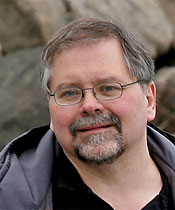Thursdays, 4:30–5:30 pm
6 January–10 March 2011
School of Aquatic & Fishery Sciences
102 Fishery Sciences (auditorium)
1122 NE Boat Street (map)
University of Washington
Reception follows each talk
For more information, contact:
Trevor Branch, 206-221-0776
tbranch@u.washington.edu
courses.washington.edu/susfish
Funding for the Series is generously
provided by Tanya Bevan, friends of Don
Bevan, the UW School of Aquatic and
Fishery Sciences, and NOAA's Alaska
Fisheries Science Center and
Northwest Fisheries Science Center.
Ocean Acidification: Effects on Fisheries and Oceans
13 Jan

John Smol
Queen’s University (Kingston, Ontario), and Canada Research Chair in Environmental Change
Lessons Learned from Acidification In Freshwater Ecosystems
Abstract
Lake acidification was considered by many to be the major environmental issue in parts of North America and Europe in the 1980s and early-1990s. Although significant environmental legislation was implemented about 20 years ago, the problem still exists, although some regions are beginning to show signs of recovery. However, it is becoming increasingly clear that there are still many legacies of acidification, especially within the context of multiple stressors. This presentation will review some of the approaches used to identify and study this problem, with a focus on whole lake manipulations and paleoenvironmental reconstructions of long-term environmental change. Many lessons can be learned from these studies that can now be applied to new environmental problems such as climatic change.
Bio
John P. Smol is professor at Queen’s University (Kingston, Ontario), where he also holds the Canada Research Chair in Environmental Change. John also co-directs the Paleoecological Environmental Assessment and Research Lab (PEARL), a group of over 30 students and other scientists dedicated to the study of global environmental change, and especially as it relates to lake ecosystems. John has authored about 400 journal publications and chapters since 1980, as well as completed 18 books. He was the founding Editor of the international Journal of Paleolimnology (1987-2007) and is the current Editor of the journal Environmental Reviews. Since 1990 he has been awarded over 25 research and teaching awards, including the 2004 NSERC Herzberg Gold Medal as Canada’s top scientist or engineer. He has also won 6 teaching awards, including the 3M National Teaching Fellow, considered by many to be Canada’s highest teaching honor. Nature magazine has just named John as Canada’s Top Mid-Career Scientific Mentor.
Readings
- Queen’s Alumni Review. 2010. The Folly of Denial. Issue 3.
- Smol, J. P. 2008. Acidification: Finding the “Smoking Gun”. In Pollution of Rivers and Lakes: A paleoenvironmental perspective, (2nd Edition). Blackwell Publishing, Oxford. 383 pp.
- Smol, J. P. 2010 The power of the past: using sediments to track the effects of multiple stressors on lake ecosystems Freshwater Biology 55 (Suppl. 1): 43–59.
- Jeziorski, A., N. D. Yan, A. M. Paterson, A. M. DeSellas, M A. Turner, D. S. Jeffries, B. Keller, R. C. Weeber, D. K. McNicol, M. E. Palmer, K. McIver, K. Arseneau, B. K. Ginn, B. F. Cumming, J P. Smol. 2008 The Widespread Threat of Calcium Decline in Fresh Waters Science 322: 1374-1377.